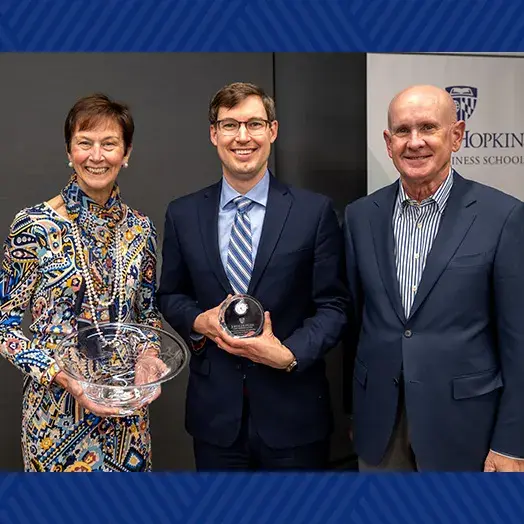Through AIM-AHEAD, Carey Business School faculty are helping U.S. researchers utilize AI to advance diabetes and other health research.

AI for better health: Carey joins national effort to build workforce and capacity
Johns Hopkins Carey Business School is part of a federally supported nationwide collaboration to develop new capabilities and research capacity around artificial intelligence. The initiative, known as AIM-AHEAD and funded by the National Institutes of Health, is working to build partnerships that enhance the participation and representation of researchers from communities currently under-resourced in AI. The goal is to encourage the broader development of AI models to improve health and health technologies.
Carey Professor Gordon Gao, who is also co-director of Carey’s Center for Digital Health and Artificial Intelligence, oversees the training activities at Johns Hopkins for the AIM-AHEAD initiative. Working with faculty from across Carey Business School and Johns Hopkins University, the CDHAI team is creating training programs and professional development opportunities for researchers at other institutions including Howard University, Morgan State University, and San Diego State University.
One such program is called the Program for AI Readiness, or PAIR, with a multidisciplinary approach includes AI/ML experts and clinical and public health scholars.
“We provide this holistic 360-degree support to the research teams from the collaborating institutions,” said Gao. “They are learning how to do research, and how to write proposals. In the end, they will have AI labs up and running.”
What to Read Next

Faculty
Five reasons to rethink how your retirement is investedImproving diabetes research and treatment
Another AI training program led by CDHAI is working to improve discoveries for the prevention and treatment of type 2 diabetes, which impacts nearly 36 million Americans, according to the Centers for Disease Control and Prevention. Type 2 diabetes can also lead to significant issues with heart disease, kidney failure, stroke, and blindness. The NIH-funded Artificial Intelligence Ready and Equitable Atlas for Diabetes Insights, or AI-READI, is developing a comprehensive, ethically sourced dataset for type 2 diabetes information. The dataset includes more than 15 individual bio readings from 4,000 type 2 diabetes patients. AI-READI will train diabetes researchers to use this dataset to make AI-driven discoveries.
CDHAI Assistant Director Jennifer Bagdasarian coordinates multiple Carey faculty members in the AI Foundation Training to help diabetes researchers to use the AI-READI dataset to make AI-driven discoveries, including Carey professors Ritu Agarwal, Minghong Xu, and Wei Wang.
“For the trainees, we are providing them some basics in AI tools, especially in machine learning and deep learning so that they can use them in the research of diabetes,” said Xu, an instructor in the program “Our goal is to provide AI training, so the researchers know how to use these tools to work with the AI-READI data.”
Xu says Carey is currently providing a six-week online training course for 30 diabetes researchers with modules of AI, machine learning, deep learning, and human-AI fusion. According to Xu, the trainees are exploring how to use machine learning to combine glucose readings for wearable devices with a patient's historical medical data and environmental readings to predict the likelihood of developing retinopathy, a common diabetes complication affecting vision.
“From a Carey Business School perspective, we hope that we become the leader in AI education,” said Agarwal, who co-directs CDHAI. “Overall, it's capacity building, and it's about building the AI workforce to address pressing healthcare issues for the nation.”

